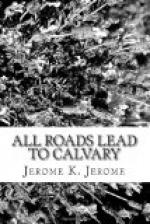“I’ve fixed you up all right at the hospital,” he said. “It was good of you to think of coming home. Don’t go away, for a bit.” It was the first time he had asked anything of her.
Another fortnight passed before they heard from Arthur, and then he wrote them both from Hull. He would be somewhere in the North Sea, mine sweeping, when they read his letters. He had hoped to get a day or two to run across and say good-bye; but the need for men was pressing and he had not liked to plead excuses. The boat by which he had managed to leave Bergen had gone down. He and a few others had been picked up, but the sights that he had seen were haunting him. He felt sure his uncle would agree that he ought to be helping, and this was work for England he could do with all his heart. He hoped he was not leaving his uncle in the lurch; but he did not think the war would last long, and he would soon be back.
“Dear lad,” said her father, “he would take the most dangerous work that he could find. But I wish he hadn’t been quite so impulsive. He could have been of more use helping me with this War Office contract. I suppose he never got my letter, telling him about it.”
In his letter to Joan he went further. He had received his uncle’s letter, so he confided to her. Perhaps she would think him a crank, but he couldn’t help it. He hated this killing business, this making of machinery for slaughtering men in bulk, like they killed pigs in Chicago. Out on the free, sweet sea, helping to keep it clean from man’s abominations, he would be away from it all.
She saw the vision of him that night, as, leaning from her window, she looked out beyond the pines: the little lonely ship amid the waste of waters; his beautiful, almost womanish, face, and the gentle dreamy eyes with their haunting suggestion of a shadow.
Her little drummer played less and less frequently to her as the months passed by. It didn’t seem to be the war he had looked forward to. The illustrated papers continued to picture it as a sort of glorified picnic where smiling young men lolled luxuriously in cosy dug-outs, reading their favourite paper. By curious coincidence, it generally happened to be the journal publishing the photograph. Occasionally, it appeared, they came across the enemy, who then put up both hands and shouted “Kamerad.” But the weary, wounded men she talked to told another story.
She grew impatient of the fighters with their mouths; the savage old baldheads heroically prepared to sacrifice the last young man; the sleek, purring women who talked childish nonsense about killing every man, woman and child in Germany, but quite meant it; the shrieking journalists who had decided that their place was the home front; the press-spurred mobs, the spy hunters, chasing terrified old men and sobbing children through the streets. It was a relief to enter the quiet ward and close the door behind her. The camp-followers:




